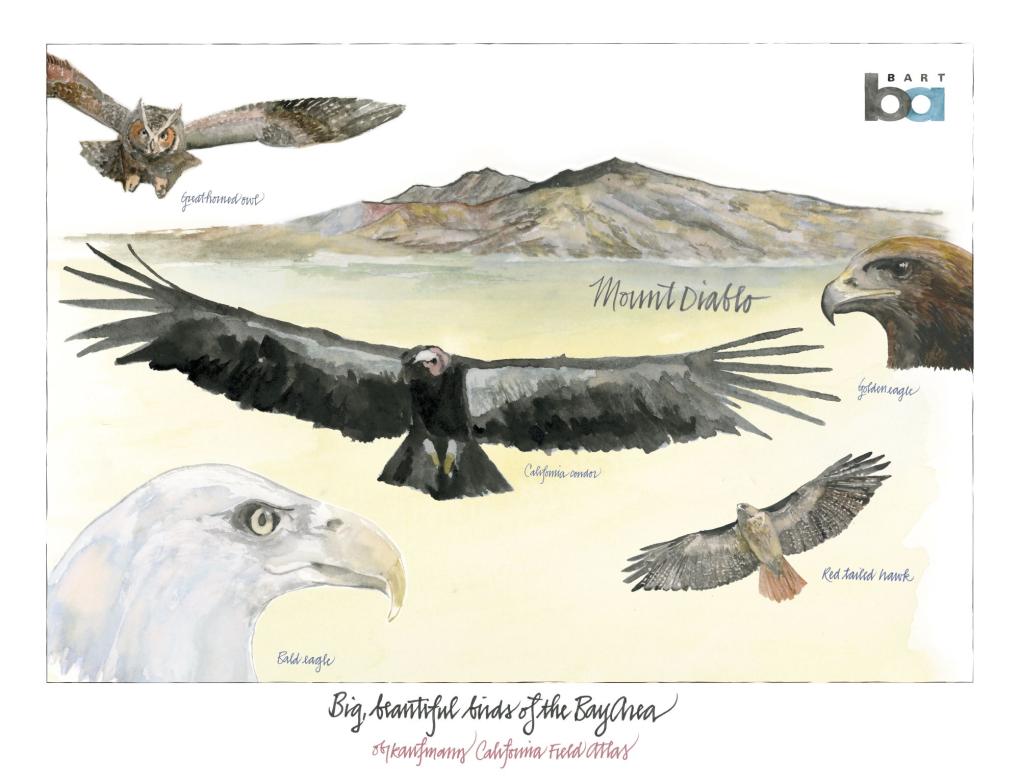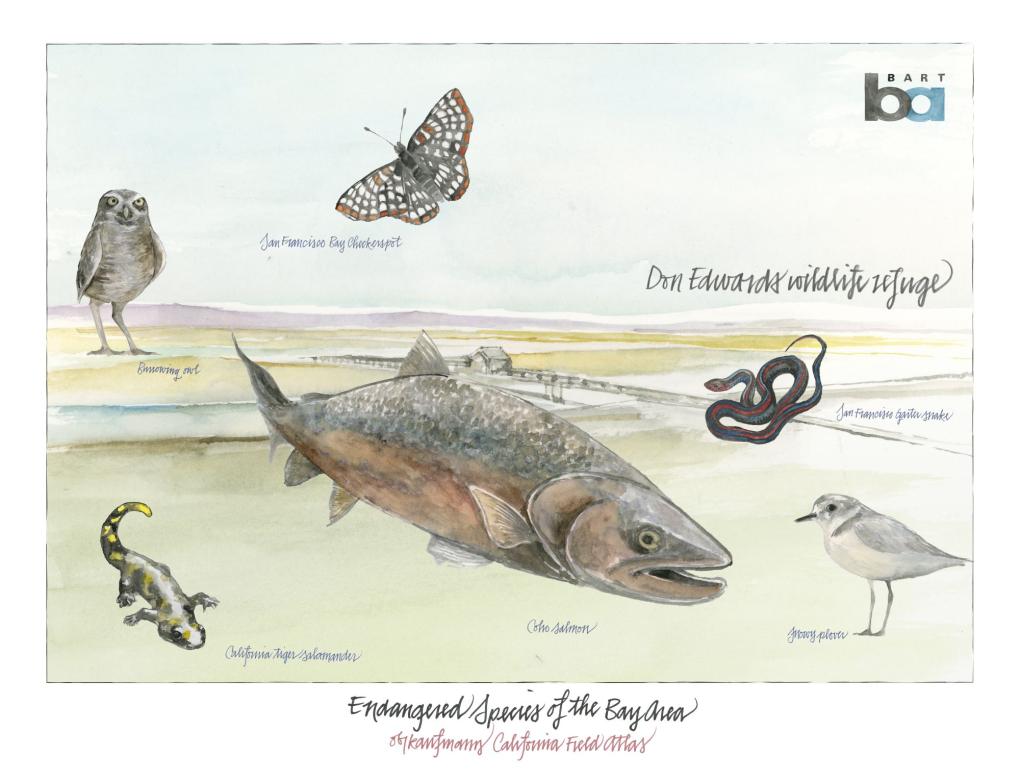Search Results
San Mateo County BART stations get $12 million dollar glow-up
The BART Board of Directors has approved nearly $12 million in capital investments for San Mateo County BART stations to improve the customer experience and to ensure the station infrastructure remains welcoming and in a state of good repair. The package of upgrades is part of BART’s Station Glow-Up Strategy, focused on sprucing up stations and parking lots to improve ambience and enhance safety.
The San Mateo County effort includes new LED lighting to improve safety and brightness; roof replacement and gutter work to address water intrusion that impacts employees, riders, and BART equipment; deep cleaning to scrub away bird droppings; landscaping; the removal of metal framed bus shelters with panels that were prone to continuous vandalism and graffiti; and other work that will improve conditions and the appearance of BART property.
This past year, BART has taken additional action to improve San Mateo County stations with deep cleaning and permanently adding two additional janitorial staff to increase cleaning in the county. BART crews repaired floors, benches, and gutters, added fresh paint to key areas, and removed obsolete equipment such as old phone booths and aging artwork at Colma Station that could not be repaired or salvaged following a review by a conservation specialists and structural engineers. Millbrae Station is currently getting new LED lighting with the work to be completed this month. In September, BART celebrated the installation of new fare gates at all San Mateo County stations, marking a major milestone in ongoing investments at the county's six stations.
Details of the upcoming $12 million in planned improvements:
- Colma Station will get new LED lighting, roof upgrades, and dated bus shelter removal.
- South San Francisco Station will get LED lighting, roof upgrades and cleaning, gutter replacement, refurbished landscaping, and dated bus shelter removal.
- San Bruno Station will get new LED lighting, roof upgrades, specialized deep cleaning of hard-to-reach areas, and safety netting replacement to protect people from falling debris.
- Millbrae Station will get gutter and downspout repairs that will address water leaking in various areas such as the concourse and platform.
Work will begin in early 2026 and will be completed by the end of the year.
“Revitalizing these stations is part of what we like to call the new BART,” said BART Board President Mark Foley. “These upgrades will improve the functional use and aesthetics of our important San Mateo County stations while demonstrating our gratitude and commitment to our continued partnership with the county.”
BART is a critical piece of the transit network in San Mateo County, and San Mateo County riders are a key part of the BART system. BART carries approximately 25 percent of transit boardings among all operators in San Mateo County and 10 percent of all day boardings for BART originate in San Mateo County. On a typical weekday, BART runs 520 trains into and out of San Mateo County.
Oakland Ballers step up to the plate to save legacy BART car the A's rejected
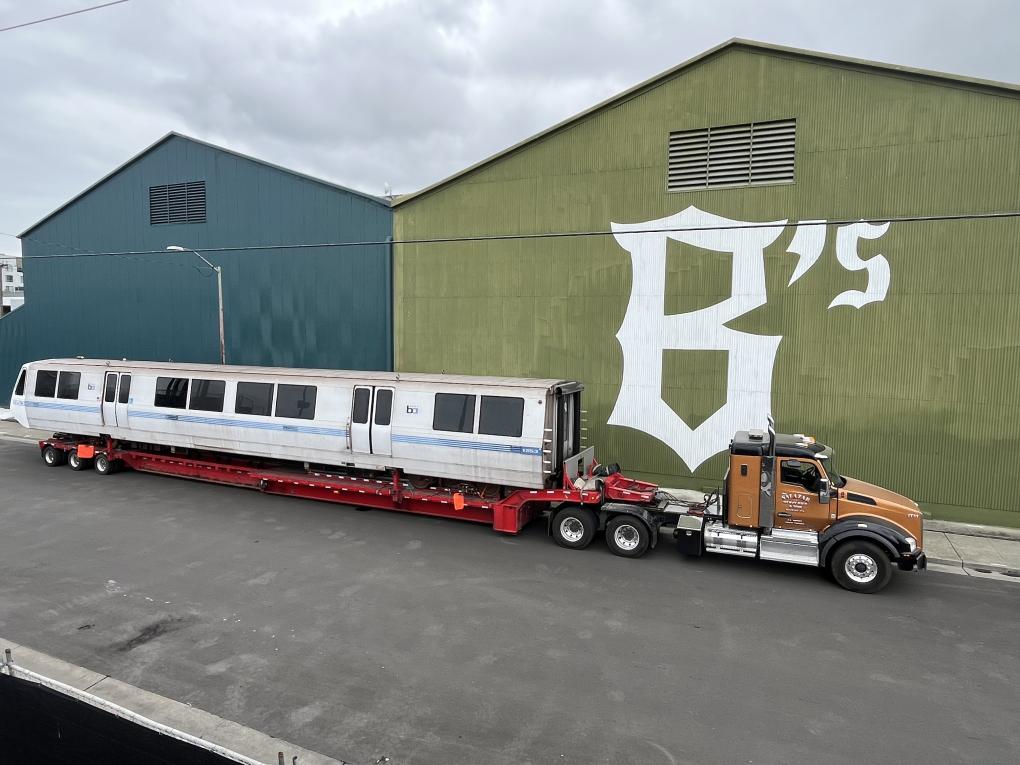
Click here for b-roll of car leaving Hayward Yard and arriving at Raimondi Park
On Thursday, April 17, a legacy BART car was delivered to the Oakland Ballers, a professional baseball team that burst onto the Bay Area athletics scene in 2024. The Ballers are a BARTable partner and wear the BART logo on their jerseys.
A flatbed truck carried the legacy car from BART’s Hayward Yard to a temporary home near Raimondi Park, where the Ballers play. Over the next year, the car will be transformed into a park concessions stand, which will be unveiled next season. BART gave the Ballers the car at no cost as part of its legacy car decommissioning program. The team was responsible for the cost of transporting of the car.
“Adding this BART legacy car is one of many examples of how our ballpark is going to continue to grow with us,” said Ballers Co-Founder Paul Freedman. “We want Raimondi Park to be a living museum full of tributes to Bay Area culture. We can’t wait to repurpose and creatively feature our BART legacy car in the near future."
Said Ballers Co-Founder Bryan Camel: "We often say we are driving the train while laying down the tracks with the Ballers. So this BART legacy car being stationed at Raimondi Park is a perfect way to celebrate the history of the Bay Area while also acknowledging the rapid development of our team’s future."
This same car was initially reserved for the Athletics, the professional baseball team that departed the Bay Area in 2024. Team officials emailed BART in 2023 to inform them they would no longer be accepting the car, which they intended to bring with them to their new stadium to commemorate their long history in the Bay Area.
“It was disappointing when the Athletics notified us by email that they no longer wanted this car,” said BART Chief Communications Officer Alicia Trost. “So, we asked Oakland’s newest professional sports team if they’d like to have it, and they responded with an immediate, ‘Yes!’ We are grateful to the team for saving this piece of Bay Area history so that Oakland baseball fans will be able to enjoy it."
This won’t be the first time the Ballers have repped BART. BART and the Ballers entered into a partnership ahead of the team’s inaugural season, with the Ballers hosting BART Night at the park in August 2024 to celebrate the role transportation plays in ensuring fans can watch their favorite teams play.
"I'm thrilled about the delivery of a legacy train car to our co-marketing partner, the Oakland Ballers! Its future home at their ballpark honors our shared history and the ongoing journey of community, connection, and celebration," said BART Principal Marketing Representative Jill Buschini, who oversees BART's co-marketing partnerships.
Raimondi Park is under a mile from West Oakland Station, and the Ballers offer free shuttles that run every 20 minutes from the station to Campbell St. between 18th and 20th, starting three hours before game time and a half hour after the game ends. Opening Day at Raimondi Park is May 20.
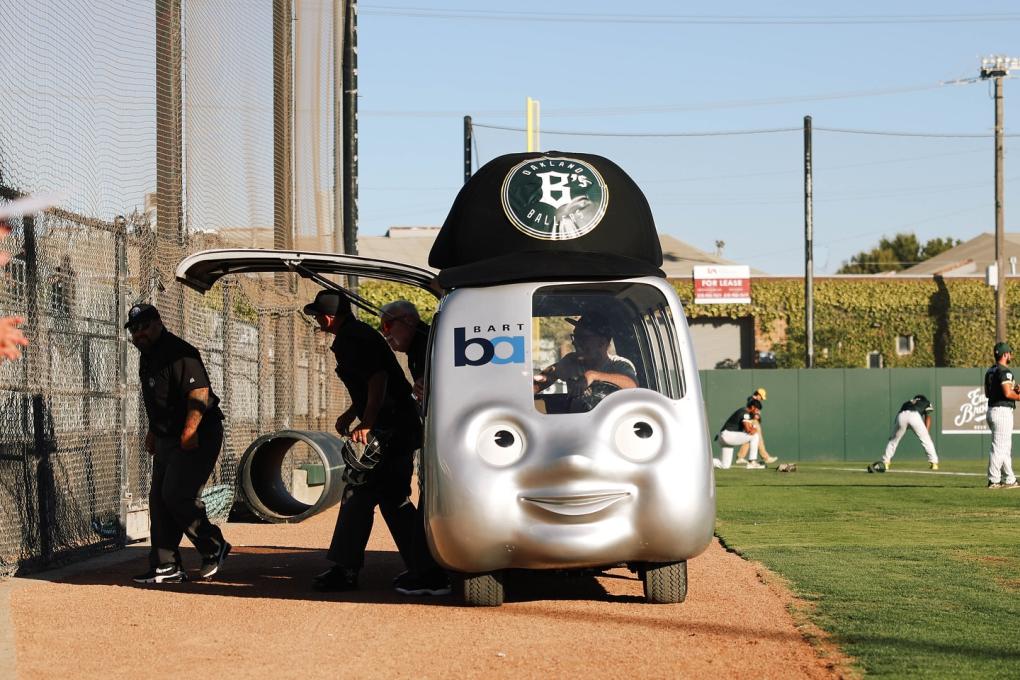
The BARTmobile on the field at Raimondi Park during BART Night at the Ballers in 2024.
BART officially retired its legacy fleet, which carried passengers for more than 50 years since the opening of the system, at a ceremony and final ride in April 2024. All BART trains in service are now made up of new cars.
“We are extremely excited to see these legacy cars being delivered to their new homes. Although this particular car was initially slated to move with the Athletics to their new ballpark in Las Vegas, we are equally as thrilled to know that this car will be staying local for Bay Area residents to continue to enjoy for years to come!” said Brian Tsukamoto, BART Legacy Car Decommissioning Manager.
BART’s legacy cars have a tremendous sentimental value with passengers in the greater San Francisco Bay Area, and we wanted to ensure the historic vehicles would have a second life. BART gave the public the opportunity to submit proposals for repurposing retired cars, and eight recipients were selected after describing what they planned to do with the vehicle. Two recipients, the Athletics among them, later declined.
The recipients are reusing their cars for a multitude of purposes, including a short-term rental in the Sierras, a regional fire training center in Hayward, and a bike shop and clubhouse for Oakland youth. Three cars were also awarded to the Western Railway Museum, which is establishing a Rapid Transit History Center.
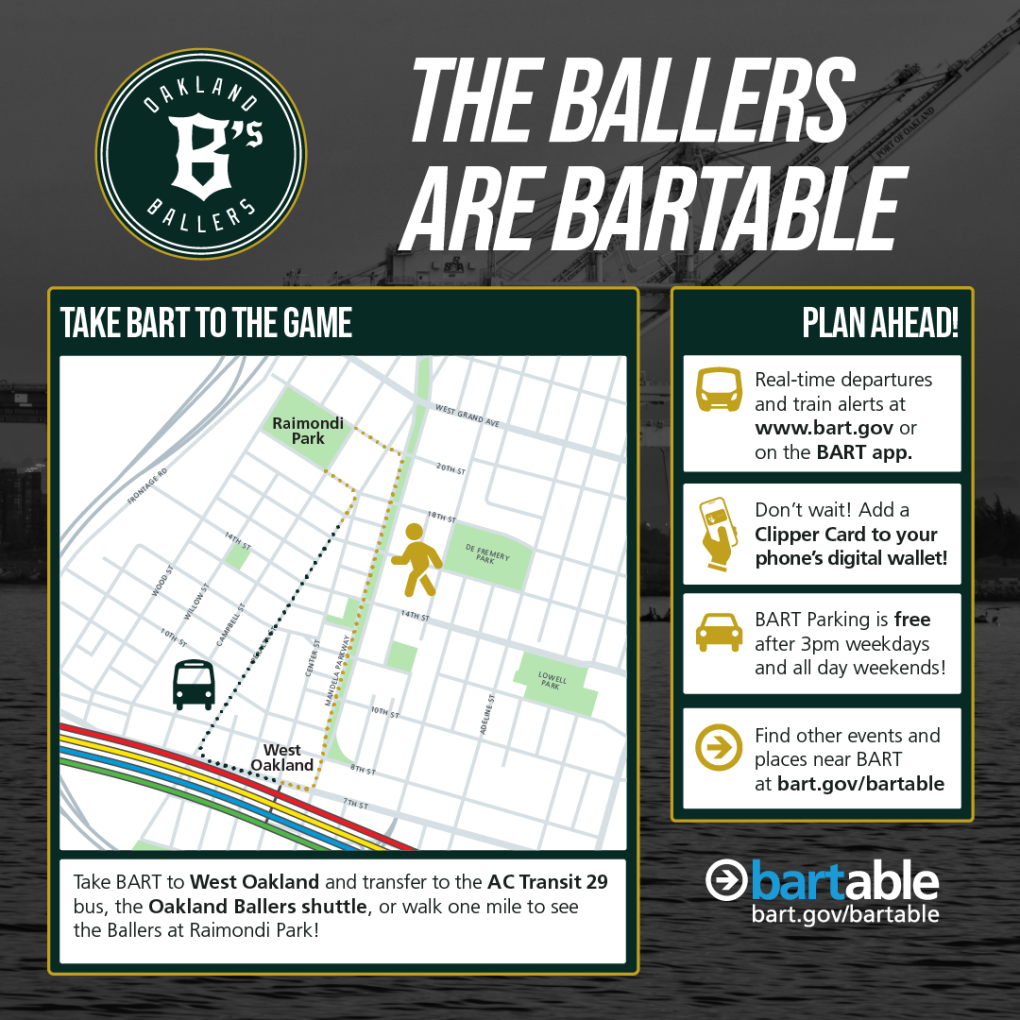
Thursday, May 16: Ride your bike to BART and beyond for Bike to Wherever Day
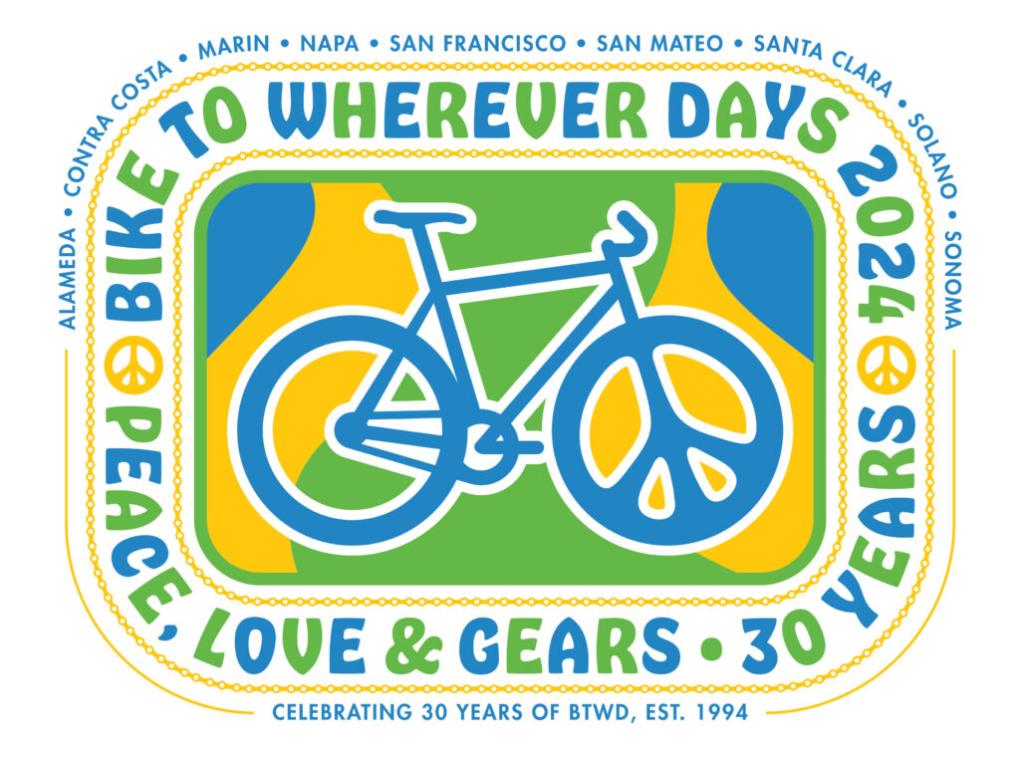
Bust out your bicycle and join BART in celebrating Bike to Wherever Day on Thursday, May 16.
BART is sponsoring the annual celebration of cycling and hosting 24 “energizer stations” throughout the system. If you visit one of the BART stations listed below on Thursday morning, you’ll be greeted by Bike to Wherever Day volunteers handing out thousands of commemorative swag bags.
Bike to Wherever Day began in 1994 as Bike to Work Day as a way to encourage people to ditch their cars and hop on their bikes. Things have changed since that first Bike to Work Day, and the annual event has transformed into a monthlong celebration of bicycling, called Bike to Wherever Days. The cornerstone of the month is Bike to Wherever Day on Thursday, May 16 – exactly thirty years after that first Bike to Work Day.
Local organizers of Bike to Wherever Day include BARTable partner Bike East Bay, Silicon Valley Bicycle Coalition, and BikeHUb, which operates bike stations at some BART stations (more on bike stations below).
Energizer stations will be positioned throughout the BART system on the morning of Thursday, May 16. For exact times and to view the full list of energizer stations, visit Bike East Bay’s Bike to Wherever Day webpage.
Participating BART stations include:
Ashby
Antioch
Concord
Downtown Berkeley BART Bike Station
Daly City
Dublin/Pleasanton
El Cerrito del Norte
El Cerrito Plaza
Fruitvale
Hayward
Lake Merritt
Millbrae
Orinda
Pleasant Hill/Contra Costa Center
Richmond
San Bruno
San Leandro
South San Francisco
South Hayward
Union City
Uptown/19th Street Oakland BART Bike Station
Warm Springs/South Fremont
West Dublin/Pleasanton
West Oakland
This year, Bike to Wherever Days will also include a family-focused and BARTable ride called East Bay Kidical Mass. The group will gather on Saturday, May 11, at 10:30am at Lake Merritt Station for a relaxed and inclusive ride around Lake Merritt.
Bikes on BART
Click here to learn everything you need to know about bikes and BART, including rules and the locations of bike storage facilities.
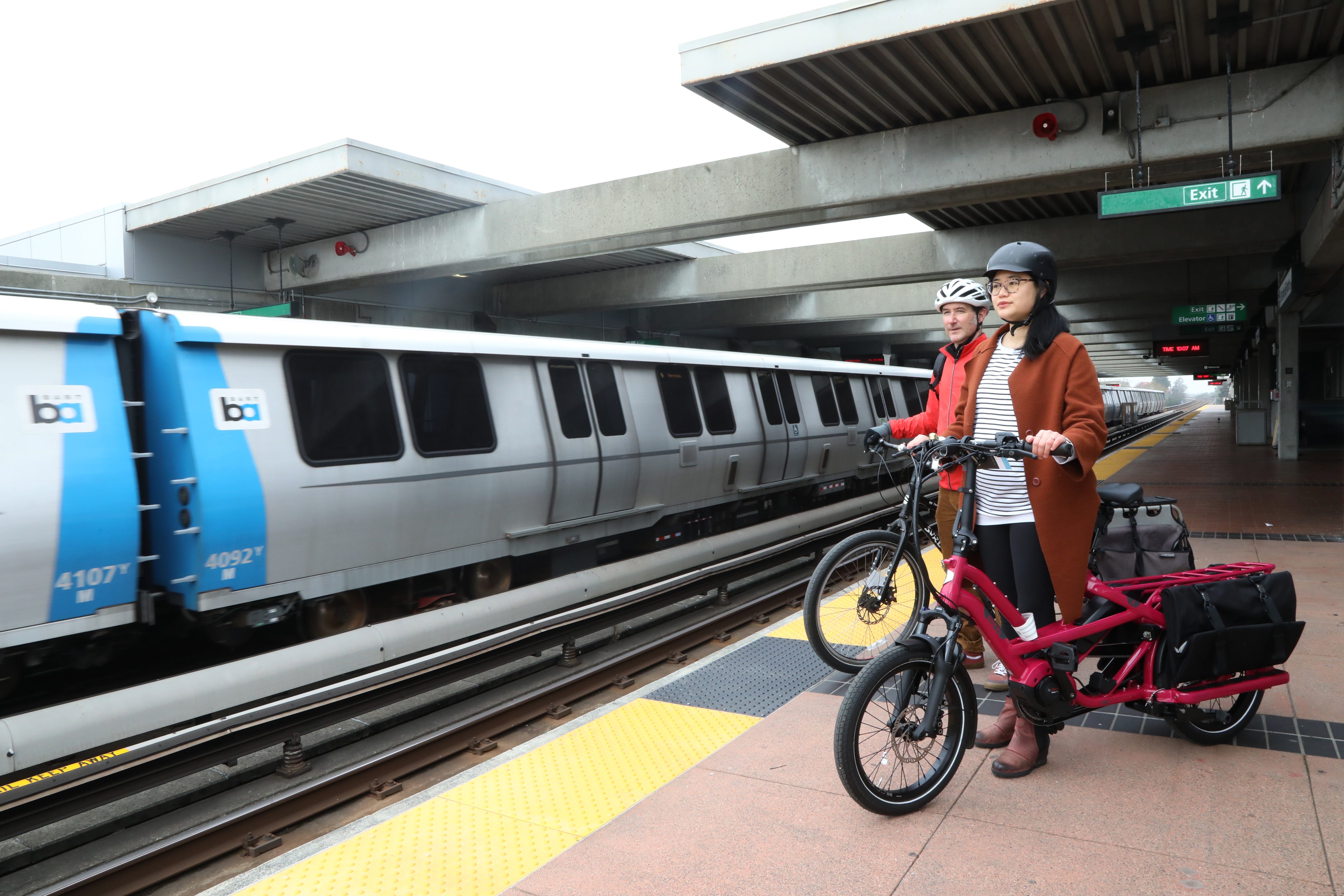
BART loves bikes, and we even changed our rules recently to allow bicycles on escalators throughout the BART system with the exception of ten narrow escalators (at 19th Street/ Oakland, Antioch and the Oakland Airport Connector).
Our stations feature high-security bike racks, bike lockers, and both valet and BikeLink self-park Bike Stations. The staffed Bike Stations at Downtown Berkeley, Fruitvale, and 19th Street/Oakland are open for parking weekdays 7 a.m. - 7 p.m. and even have retail and maintenance services, in case your bike needs a tune up.
Plan your route using BART's Trip Planner, which offers multi-modal, end-to-end itineraries for bike + transit trips. It features customizable bike speed options, including an option for e-bikes (select the settings/tool icon to customize your options). BART's Trip Planner includes results for more than 30 transit systems in the Bay Area and is available on web, mobile, and the official BART app.
Announcing the winners of the BART Lines Teen Poetry Contest – get a winning poem today!
Beneath the city's glow, where BART's lines softly weave,
A story of us begins, in the twilight of the eve.
– Under the Stars of Valencia, Elsy M.E., BART Lines Teen Poetry Contest Winner
<< Watch Fruitvale station agents Steffi and Ebony dispense a winning poem >>
On Friday, April 12, the BART Art Program and BART Communications are thrilled to announce the winners of the BART Lines Teen Poetry Contest 2024! You’ll find the list of winners and their poems when you scroll down this page. The winners were selected by contest judges and partners 826 Valencia and Youth Speaks – two outstanding organizations working to lift youth voices in the Bay Area.

The 31 winning poems engage with an enchanting array of forms, meter, topics, and themes. In the collection, you will find villanelles and tankas, botanic gardens and centipedes, sunsets and carrots, and even two crabs destined for a boiling pot. Our winners range in age from 14 to 19 and reside all over the Bay Area, from Foster City to Fremont, Concord to Oakland, and many cities in between.
The BART Lines Teen Poetry Contest is a celebration of the region’s youth, their expansive imaginations, and their immense capacities for compassion and creativity. And the winning poets’ fantastic work will undoubtedly delight riders passing through stations who are looking for something to do on the train other than look at their phones (sometimes your eyes need a rest from a screen, right?).
The 31 winning poems, written by local youth ages 13 to 19, are now available in BART’s free Short Edition Story Dispensers (locations below) as well as our Short Edition online story portal.
We highly recommend getting a printed poem from a story dispenser. To get a contest poem, hover your hand over the “5 Min” button. When the dispenser prints the poem, you’ll find a special image on the bottom of the eco-friendly and recyclable paper.
These poems are collectibles, and we encourage you to take photos or film yourself getting a poem – tag us on Instagram (@sfbayarearapidtransit) or Twitter (@sfbart) and use the #BARTLines.
Congratulations to the Winners of the BART Lines Teen Poetry Contest
Winners listed in alphabetical order
Frames of Motion – Aashna S.
I'm from Union City, where daylight's clouds kiss – Aarzu S.
I have to think about BART now – Ana T.
Sequence Across Golden Gate Bridge – Ariel Z.
Bay Area Rapid Tankas – Bulian Jauer
Love Letter to the Bay – Carla Araujo
Haven – Elle Fardella
Where I'm From – Ellie Liew
This is the Bay – Eloisa Lin
Under the Stars of Valencia: A BART Love Story – Elsy M.E.
station conversation: where the people are – Emily T.
These Two Crabs On the Green Line are Going to Die – Francis L.
Sunsets Filled with Orange Rays of Red – Gerardo Castaneda
My Home – Gian S.
sandstone – Hunter Stoval
You see, to me – Juliet S.
A Familiar Breeze – Kiana G.
sf pride 2023 – Lia Le-Nguyen
home, forever and always. – Margaret B.
Journey Around the Bay – Matthew Guo
The Bay is Home – Nairobi Williese Barnes
the bay – Nidhi Nadgir
souvenir – Nitika Sathiya
Villanelle for 42nd St. – N.R.
A paper ticket trip down the richmond line – OG Nguyen
The Cycle – ORLY
A Work of Art – Pahal V.
bart ode – Rose Garcia
Haibun for lazy weekends in the Sunset District – Sophia T.
Bay is bae – Soyme
Where My Parents Lived – Vivian Owens
How to Read the Winning Poems
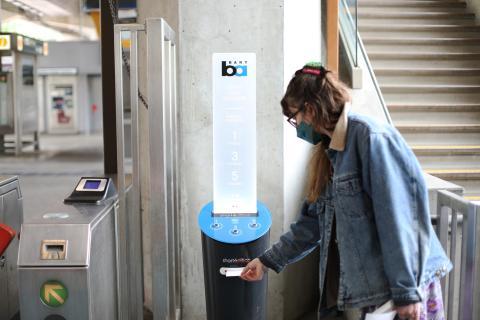
*BART’s Short Edition Story Dispensers*
The dispensers are free vending machines for creative writing, dispensing stories on eco-friendly recyclable, receipt-like paper. To receive a BART Lines poem, wave your hand over the button on the far right, labeled with either BART Lines sticker or “5 minutes”. Poems are randomly dispensed. The dispensers are currently located at the following stations:
Balboa Park
Downtown Berkeley
Fruitvale
Pleasant Hill
San Leandro (pending installation)
*BART’s Short Edition website*
Visit bart.short-edition.com to read the poems online. Click the blue “Contest winners” button.
*Coming Soon: Short Edition Story Discs*
The discs are digital versions of the dispensers that allow you to access unlimited content for free on a smartphone. They will soon be installed at the following stations:
Daly City
Dublin/Pleasanton
Embarcadero
About the BART Lines Teen Poetry Contest
The contest, which launched in late winter, solicited poetry from local teenagers who live in the five counties where BART operates. We asked that the poems loosely relate to the theme “Bay is Home.”
By providing a forum for teen voices and creativity with BART Lines, BART is underlining our belief that the words, ideas, and foresight of youth matter. Like public transportation, poetry has the power to take you places, and the winning BART Lines poems are a case in point.
In addition to their work being published on the Short Edition website and in our dispensers and discs, the winners received a $75 honorarium. Their works will also be collected in a chapbook – stay tuned for more information.
Winners will also be invited to read their poems at special events, including the upcoming Bay Area Book Festival on June 2 in Downtown Berkeley, and their work will be featured in our stations and trains and on social media (among other venues).
Keep up to date with events and future contests at bart.gov/bartlines and by following BART’s social media channels.
Judges+Partners
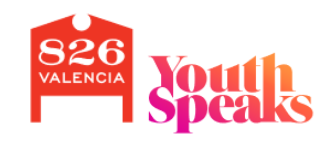
826 Valencia is a nonprofit organization dedicated to supporting under-resourced students ages six to eighteen with their creative and expository writing skills and to helping teachers inspire their students to write. Our services are structured around the understanding that great leaps in learning can happen with individualized attention and that strong writing skills are fundamental to future success.
Youth Speaks is a leading presenter of Spoken Word performance, education, and youth development programs that was founded in San Francisco in 1996. Trailblazers of local and national youth poetry slams, festivals, and more, Youth Speaks offers a comprehensive slate of literary arts education programs and provides numerous opportunities for youth to be published and heard.

Increase in BART Police safety presence resulting in fewer trains delayed by unwanted behavior
The latest numbers from the BART Police Department show as enforcement activity has increased, the number of trains impacted by unwanted behavior has declined. In the first six months of this year, BART PD reported 10,359 enforcement contacts, which is nearly double from the 5,490 enforcement contacts reported for the first half of 2023. The increase in activity comes as BART continues to implement its Safe and Clean Plan. A focal point of the plan has been a major boost in BART PD’s visible safety presence on trains and in stations supported by devoting additional resources to hire and retain more officers.
As enforcement contacts have increased, the number of trains impacted by unwanted activity has been trending downward since mid-2023. The number of BART PD incidents causing delays has dropped from a high of 374 in May 2023 to 255 in August (see chart below).
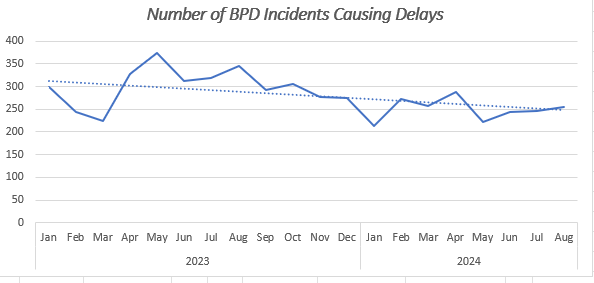
“Our presence deters crime and allows us to address problems before they turn into incidents that cause train delays,” said BART Police Chief Kevin Franklin. “I think this is very encouraging because it shows that our presence is a positive thing for on-time service and the safe and clean customer experience.”
More riders have been telling BART they notice the difference in safety since implementation of the new deployment strategy that emphasizes presence on trains and in stations. The last four consecutive quarters have been the first in BART’s history where the percentage of riders who reported seeing BART PD on their trips exceeded the department’s official goal of 12%. In the most recent quarter (Q4 2024), more than 19% of riders reported seeing BART PD’s safety presence.
BART PD is continuing to recruit more officers to boost its visible safety presence to bring more safety gains to our riders. The department currently has 17 openings for sworn officers. BART PD offers competitive pay including a hiring bonus of $15,000 for lateral transfers and academy graduates. To learn more, go to JoinBARTPD.com.
Original artworks by local artist Obi Kaufmann to be featured in ad spaces at BART stations
Click here to sign up for the One Book One BART mailing list.
Three original watercolor paintings by celebrated poet-artist-naturalist Obi Kaufmann are now enlivening BART stations by taking over ad spaces across the system. The artworks are being released in tandem with the launch of the spring 2025 One Book One BART book club. The club’s official selection is Bay Area Wildlife: An Irreverent Guide by Jeff Miller, which was illustrated by Kaufmann.
The unveiling of Kaufmann’s artworks marks the relaunch of BART’s Poster Art Program. The goal of the program, which has featured original works by Miwako Nishizawa, Monico Chavez, Josh Ellingson, and Owen Smith, is to enhance the physical environment of BART stations and celebrate the wealth of artistic talent in the Bay Area. The program is a joint effort between BART Communications, BART Marketing, and the BART Art Program.
Kaufmann’s original paintings feature some of the local species found in the natural and urban spaces accessible by transit, including San Francisco, Don Edwards Wildlife Refuge, and Mount Diablo. Each panel is themed around a different group of wildlife: “Big, beautiful birds of the Bay Area,” “Our wildlife neighbors of the Bay Area,” and “Endangered species of the Bay Area.”
“Transportation agencies throughout the United States and internationally have seen the importance to community and customers in bringing art and culture into transit spaces,” said BART Chief Communications Officer Alicia Trost. "Bringing art to our system also builds a sense of safety and belonging, as we have repeatedly heard from our Not One More Girl initiative outreach."
“Artworks enhance the travel experience with education, joy, information about, and celebration of a particular location and its unique characteristics," added BART Art Program Manager Jennifer Easton. "Obi’s artwork demonstrates his deep appreciation and passion for our neighbors in the wild, reminding us that reducing our environmental impact by using transit can help preserve their critical environments.”
On Saturday, May 3, from noon to approx. 1pm, Kaufmann will partner with BART to lead a first-of-its-kind BART Train Expedition. The free, family-friendly ride on an in-service passenger train will take us on a journey through the East Bay’s mosaicked, ecological landscape – all through the windows of a Yellow Line train. During the ride, Kaufmann will transport us through “deep time” as he tells stories about the area’s ecosystems, water, fire, infrastructure, volcanic history, trees, and more. RSVP here and scroll down to learn about other upcoming One Book One BART events.
Kaufmann’s original BART paintings will be available for purchase as 11x14 art prints, coming soon to BART’s merchandise store Railgoods. Railgoods will also sell unique “Animals by BART” t-shirts featuring the fauna displayed in Kaufmann’s paintings. Sign up for the mailing list at the link above and follow BART on social media to be alerted to the release of the prints and t-shirts.
Oakland-based Kaufmann is known for his illustrated books on ecology and geography, including the award-winning California Field Atlas and his latest, The State of Fire: Why California Burns. Kaufmann brings his signature style – soft watercolor illustrations and handwritten titles that mimic field guides of yore – to the paintings he created for BART.
"Growing up in the Bay Area as a young naturalist, I relied on BART to get me to the parks, open spaces, and wild landscapes that inspired me to become the writer and artist I am today,” Kaufmann said. “So many decades later, I am happy to report that those same places are accessible, and teaming up with BART to celebrate the Bay Area's rich wildlife legacy is a dream come true."
In addition to celebrating ecology, Kaufmann’s works are an urgent reminder that the Bay Area is home to many at-risk wildlife populations. Sustainability is one of BART’s core values, and it has been since our system was founded. As highlighted in our Transit Saves campaign, if it weren’t for BART, we’d have to plant a forest the size of San Francisco every two years to offset the CO2 that would be generated from increased vehicle emissions. The people of the Bay Area need BART, and so do the plants and animals that reside here.
“We want people to think of our stations not solely as liminal spaces to mindlessly pass through, but places where you can experience art, culture, and even a sense wonder,” said BART Principal Marketing Representative Michelle Robertson, who spearheaded the relaunch Poster Art Program project. “Some of my fondest transit memories involve riding BART to regional green spaces, and I’m grateful to Obi for giving all of us a reason to celebrate transit and the wealth of experiences it takes us to."
The artworks also serve as inspiration and encouragement for people to use public transit to get outside! To get going on your next outdoor adventure, visit bartable.bart.gov/outdoors and discover a wealth of hikes, bike rides, and outdoor itineraries by BART stations.

One Book One BART returns with a natural history theme
In keeping with the natural history theme, BART is excited to announce the return of One Book One BART. The club is a novel strategy for rider and employee engagement that invites members of the public to read the same book at the same time and participate in themed events in BART trains and stations. This will be the third iteration of One Book One BART, which began in 2022 with Hua Hsu’s Stay True.
This year’s selection is Bay Area Wildlife: An Irreverent Guide (Heyday Books) by conservationist Jeff Miller, with illustrations by Obi Kaufmann. Bay Area Wildlife takes an educational and highly entertaining approach to the region’s local fauna, “revealing why each of these creatures matters, as well as the threats that loom over our region’s incredible biodiversity.”
The book will serve as a jumping off point for a series of outdoor excursions by BART stations and on trains. Stay up to date by visiting bart.gov/bookclub and signing up for the email list at the top of the page.
One Book One BART events
All events are free to attend, but an RSVP is required.
Guided Nature Walk with Author Jeff Miller and Pals
When: Saturday, April 19
The first walk will leave the station at 9am. The walk from 19th to the Rotary Center will take approx. 45 - 60 minutes. RSVP for the first walk (9am) on Eventbrite here
The second walk will leave the station at 11am. The walk from 19th St. to the Rotary Center will take approx. 45 - 60 minutes. RSVP for the second walk (11am) on Eventbrite here
Where: 19th St/Oakland Station to the Rotary Nature Center
Itinerary subject to change.
Meet Bay Area Wildlife author Jeff Miller as he and some conservationist colleagues and local naturalists take us on a ~1.4-mile guided nature walk of Lake Merritt that will begin at 19th St. Station in Downtown Oakland.
Expect to see lots of water birds and an assortment of herons and egrets, maybe even some fish! The walk will end in the grassy area adjacent to the Rotary Nature Center on the lake, where participants will have the opportunity to rendezvous with and learn from local environmental organizations.
Wear comfy walking shoes, fill up your water bottle, and bring whatever else you may need for the walk. And don’t forget your copy of Bay Area Wildlife – Jeff will be signing books.
Bike Ride and Birdwatching
When: Saturday, April 26
- Early short ride - Departs North Berkeley Station at 7:45am. The ride is approx. 8 miles roundtrip and will end at North Berkeley Station at approx. 9:45am. RSVP for the 7:45am short ride on Eventbrite.
- Long late ride - Departs North Berkeley Station at 10am. The ride is approx. 15 miles roundtrip and will end back at North Berkeley at approx. 1pm. RSVP for the 10am long ride on Eventbrite
Where: North Berkeley Station
Itinerary subject to change.
Heath Maddox, BART Manager of Bicycle and Micromobility Access Programs, and local birdwatchers will host two bike rides -- a shorter one for early birds and a later one for those looking for a long ride -- with birdwatching stops along the way. The ride will start and end at North Berkeley Station.
In addition to the expertise of local birdwatchers, we’ll have a digital guide featuring info on birds we might spot on the ride. Find the short 7:45am route here and the long 10am route here.
Bring your bike, helmet, and binoculars – we’ll have extras on hand to lend. You should also bring anything you need to be self-sufficient and keep your bike rolling (spare tube, patch kit, pump, etc.). If you do not have a bike, you can rent one from the Bay Wheels hub at North Berkeley Station.
BART Train Expedition with Obi Kaufmann
When: Saturday, May 3, noon to approx. 1pm
Where: Pleasant Hill/City Centre Station to 12th St/Oakland Station
"Bay Area Wildlife" illustrator and acclaimed poet-naturalist Obi Kaufmann takes the public on a first-of-its-kind BART Train Expedition! The free, family-friendly ride on an in-service passenger train will take us on a journey through the East Bay’s mosaicked, ecological landscape – all through the windows of a Yellow Line train. During the ride, Kaufmann will transport us through “deep time” as he tells stories about the area’s ecosystems, water, fire, infrastructure, volcanic history, trees, and more.
At the end of the approx. 30-minute ride, we’ll disembark at 12th St./Oakland Station and walk with Obi to Frank Ogawa Plaza, where we’ll pay homage to the Town’s most famous oak tree.
About Obi Kaufmann

For poet, painter, and naturalist Obi Kaufmann, California is a magic network of living systems connecting ecology and beauty in a grand quilt, holding enough science, mythology, and language for a hundred field atlases to come. Obi Kaufmann regularly travels around the state, presenting his work and vision as keynote addresses to such groups as the Klamath-Siskiyou Wildland Center, Pacific Forest Trust, the Mojave Desert Land Trust, the Mechanics Institute of San Francisco, the Anza Borrego Foundation, the Mono Lake Committee, the University of California at Berkeley Botanical Garden, the University of California at Davis Plant Sciences Department, the University of California Santa Barbara Department of Water Sciences, the Peninsula Open Space Trust, the California Native Plant Society, the Wilderness Society, and the Audubon Society. Obi had a 2022 residency with the National Wildlife Federation as the illustrator for the Wallis Annenberg Wildlife Crossing in the Santa Monica Mountains National Recreation Area. One year later, in 2023, he was the artist in residence for the National Park Service at the Whiskeytown NRA. Obi’s essays and paintings have been published in Dark Mountain Literary Journal, Zyzzyva Literary Journal, Bay Nature Magazine, Western Art & Architecture, Sunset Magazine, Juxtapoz Magazine, and On the Range Magazine. His 2023 essay "The Mind of the Redwood Forest" won an honorable mention as one of the best essays in the country, as awarded by the Norton Books Anthology. Obi regularly posts his work on Instagram as @coyotethunder. He is published by HEYDAY and represented by WILDBOUNDPR. Tune into to his podcast, PLACE AND PURPOSE, with cohost Greg Sarris.
Call for artists: Sell your work at Let's Glow! BART Anime Festival on September 6

The call for artists is now closed.
BART is seeking artists to sell their work at BART’s upcoming anime festival, Let’s Glow! The festival will be held at Warm Springs/South Fremont Station on Saturday, September 6, from 4:30pm to 8pm.
We are looking for 15 to 20 artists of all skills, styles, and mediums to table at this first-of-its-kind celebration of BART, art, and anime. Tabling is free!
Artists must apply to sell at the event, and BART’s anime team will select the roster of vendors from the applicant pool. While art need not feature transit, strong preference will be given to work that does. We encourage artists to make BART-themed artwork to sell, but we ask that the fan art does not contain the BART logo to distinguish it from official communications. Art must be appropriate for an all-ages audience.
Some examples of the type of work we’re looking for:
- A print, postcard, or bookmark depicting a BART station in the artist’s preferred style
- T-shirts, tote bags, keychains featuring a train operator character
- A download code to an album of train departure melodies
Surprise us! We are looking for originality and creativity.
Submit your work at https://bart-anime.notion.site/216b53326cb280dd8549e02d7d3d615e
Deadline: Sunday, August 17, 2025, 11:59pm
More on Let’s Glow!
This is a first-of-its-kind celebration of BART, art, and anime that will feature food and boba stands, lantern decoration, live DJ group AniClover, wotagei lessons from SanFlare, itasha decorated cars, and more. We will release additional details soon. This is a free, un-ticketed event.
Let us know you're coming - RSVP here: https://bartletsglow.eventbrite.com
Read about the BART Anime Project at bart.gov/anime
From swimming holes to Star Wars drone shows: Take BART on the town this weekend

Friday, Aug. 18, 2023 – It was yet another high ridership weekend on Saturday, Aug. 5, and Sunday, Aug. 6, as Outside Lands Music Festival, the Pistahan Parade and Festival, and other exciting events unfurled across the Bay Area. Saturday and Sunday saw 101,100 and 79,300 exits respectively meaning more than 180,000 people rode BART last weekend (that’s roughly the populations of Berkeley, Benicia, and El Cerrito combined).
Looking for something to do this weekend? Keep reading and visit our BARTable website. We publish a weekly event roundup, BARTable This Weekend, which highlights happenings around the region as well as contests and sweepstakes.
This weekend, BART will be running extra trains for these big events: the Star Wars Drone Show following the A’s game on Saturday, and the Zach Bryan concert at the Oakland Arena on Monday.
Fri/Sat/Sun: Athletics vs. Orioles at the Oakland Coliseum (plus a Star Wars Drone Show!)
The Oakland Athletics face the Baltimore Orioles on Friday, Saturday, and Sunday – and each game offers a special themed promotion. For the Star Wars Drone Show on Saturday night, BART will be running extra trains to accommodate the anticipated crowds.
Here’s the lowdown on this weekend’s games: Friday, Aug. 18 (6:40pm start time) is Jerry Garcia Night, a tribute to the legendary Bay Area musician. Saturday, Aug. 19 (6:07pm start time) is the Star Wars Drone Show (with a special Mark Kotsay Mandalorian Bobblehead on offer). And Sunday, Aug. 20 (1:07pm start time), will see a “t-shirt hoodie” giveaway for early arriving fans, presented by Cal State East Bay.
It’s also First Responders Weekend at the Coliseum, with special prices, tailgates, jerseys, and more for first responders. (Promo info here.)
Use our guide to taking BART to the game here.
Sat/Sun: Take BART to the FOG India Day Parade and Fair in Fremont
On Saturday, Aug. 19, and Sunday, Aug. 20, the City of Fremont will host the largest India Day parade on the West Coast with more than 130 booths and 50,000 attendees. To get there, take BART to Fremont Station and travel about 0.6 miles to the event site – 39439 Paseo Padre Parkway, Fremont.
The fair takes over the parkway on Saturday and Sunday from 10am to 6pm, and the parade runs Sunday from 11am to 1pm. Bollywood superstar Mahima Chaudhry will serve as the grand marshal. Keep your eyes out for the BART booth, where BART directors, staff, and officers will be on hand with free swag and information about the system and our programs. More info here.
Mon: Singer-Songwriter Zach Bryan at the Oakland Arena on Monday
Singer-songwriter Zach Bryan touches down in Oakland this Monday, Aug. 21, for a stop on his Burn, Burn, Burn tour at the Oakland Arena (take BART to Coliseum Station) with Trampled by Turtles and Levi Turner. The show starts at 8pm and doors open at 6:30pm.
BART will be running extra trains Monday night to take concertgoers home.
Explore BARTable Pools, Coves, and Lagoons
Did you know you can take BART to swim? Cool off this weekend by visiting a BARTable swimming hole. We rounded them up (with directions) in this article.
Win Tickets to the “Hippest Trip – The Soul Train Musical” World Premiere
Win two tickets for you and your guest to the world premiere of "Hippest Trip -The Soul Train Musical" at A.C.T.'s Toni Rembe Theater in San Francisco on Saturday, Sept. 2 at 8pm. Five lucky winners will take the prize! Learn more about the Broadway-bound musical and enter the sweepstakes by clicking here.
Weekend Read: The Couple Who Hosted a BART Wedding at Fairyland
On May 27, 2023, Armin Samii and Marylee Williams married in a BART-themed wedding at Oakland’s Fairyland.
The couple, who met on BART, said, “We wanted a venue that was easily accessible to our guests, and accessibility to us looks like BART. BART was where we had our first taste of not being bound by a car.”
Read more about the wedding and see the colorful photos on bart.gov/news.
Happy Riding this Weekend!
We hope you enjoy your weekend adventures aboard our trains.
Stay in touch by signing up for the BARTable This Week newsletter on the BARTable website – your one-stop shop for all things accessible by BART. You can also keep up with BARTable on Facebook and Instagram.
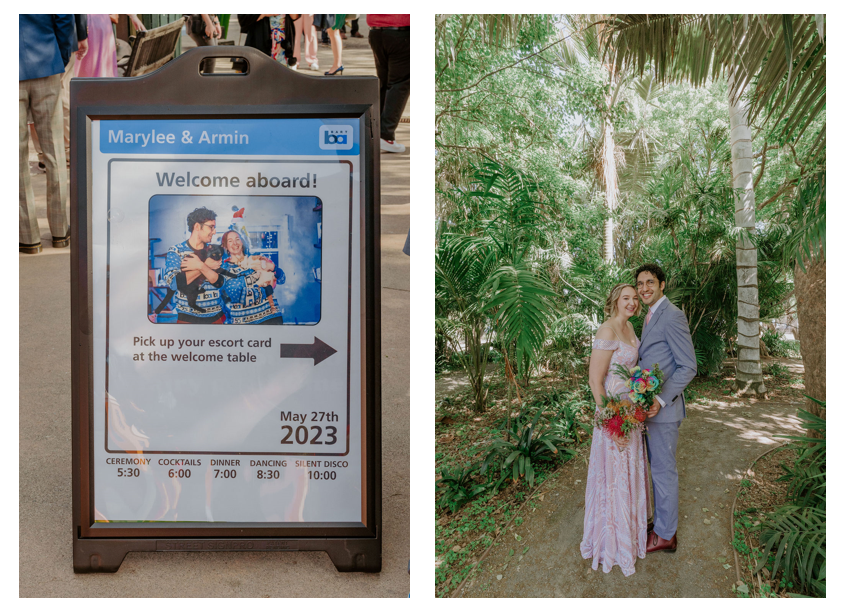
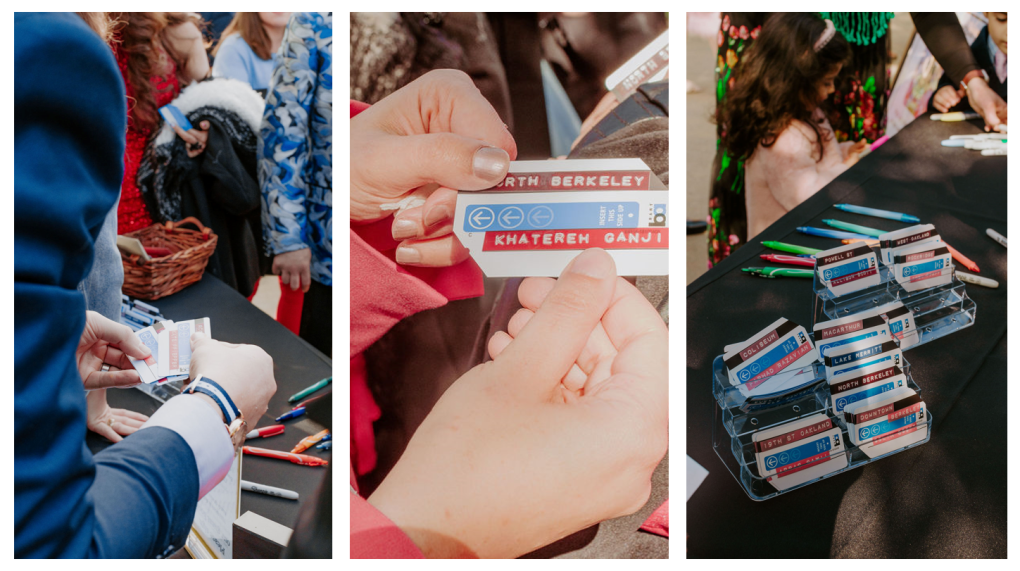

BART ridership continues to grow; September ridership increased by 10% over previous year
BART ridership continues to grow, with notable gains on weekends as Saturday ridership this September was nearly 20% higher compared to the previous year. More than 5 million trips were taken on BART in September, exceeding expected trips by 5%. Overall, ridership saw a nearly 10% increase over the same month last year.
The increase in ridership on the weekends, especially Saturdays, demonstrates that people are taking BART for purposes beyond getting to the office. For example, the Japan v. Mexico soccer match on Saturday, September 6, drew 23,000 trips to Coliseum Station, the third-highest ridership day for the station since the pandemic. In fact, ridership for the match was nearly a third higher than the average Saturday ridership for A’s games in 2019.
Ridership growth is only part of the solution to BART’s significant financial crisis. To close BART’s $375 million deficit with only fare revenue, current ridership levels would need to more than double; BART’s latest budget forecast estimates a 4% ridership increase in 2026.
BART’s slow and steady ridership recovery correlates with work from home rates in the region. While individual riders are returning to BART, they’re taking fewer trips, likely due to remote and hybrid work schedules.
September ridership highlights at a glance:
- September ridership was 10% higher compared to previous year (5,047,000 total trips).
- Saturdays in September of this year grew 20% over a year ago.
- Highest ridership day: Wednesday, September 10 (220,073).
- BayPass, the region’s all-in-one transit pass, ridership more than doubled over last September, driven primarily by UC Berkeley students voting to expand the program to the entire study body of ~45,000. The BayPass referendum was approved with 90% "yes" votes. Ridership growth at Downtown Berkeley Station has outpaced systemwide growth since the start of the Fall 2025 semester.
- Tap and Ride usage accounted for approx. 8% of total trips on weekdays and 12% on weekends. SFO Station accounts for nearly 30% of all Tap and Ride trips. Tap and Ride gives riders the ability to pay adult fares at BART fare gates using physical contactless credit or debit cards or mobile payment methods, such as Apple Pay and Google Pay.
- Usage of Clipper START, the region’s low-income discount fare program, is at an all-time high and accounted for 3.4% of total trips in September. BART has more Clipper START rides than any other agency.
Additional ridership information is publicly available and posted monthly at bart.gov/about/reports/ridership.
BART ridership continues upward trend in November with double digit growth at most stations
BART ridership continued its steady upward trend in November, with double digit growth at most stations and overall ridership increasing 11.6% compared to the previous year.
In total, riders took more than 4.4 million trips in November, many taking advantage of new fare programs and innovations, such as Tap and Ride and Clipper BayPass.
‘Tis the season to take BART to the airport. Ridership to SFO and OAK around Thanksgiving grew 12% over last year.
Riders are also increasingly using BART on the weekends. In November, Saturday ridership increased by 19% and Sunday ridership by 16% over last year. These gains come as ridership dipped modestly from October, a pattern consistent with seasonal shifts and variations in weekday and weekend travel.
Ridership growth reflects changing commuter trends, increased use of weekend and off-peak service, growing adoption of new fare programs, and an improved customer experience at BART. And on Wednesday, Dec. 10, the Metropolitan Transportation Commission released Next Generation Clipper, a new-and-improved fare payment system that makes paying for BART and other Clipper agencies faster and more convenient.
Many stations experienced robust increases in average weekday exits compared with last year this November. Some examples:
- Downtown Berkeley saw ridership rise nearly 20%
- 19th St/Oakland and 12th St/Oakland City Center ridership increased by more than 20%
- West Oakland and Embarcadero also posted notable gains of 24% and 17% respectively
Riders also continue to embrace flexible and discounted fare options:
- 11% of total trips in November used Tap and Ride, which lets you pay adult fares directly at the fare gates with a contactless debit or credit card or Apple Pay and Google Pay. BART became the first Tap and Ride agency in August; MTC rolled out the program to other Clipper agencies on December 10 with the launch of Next Generation Clipper.
- Clipper BayPass usage jumped 173% compared to the same month last year.
- Discount programs such as Clipper START also saw gains. Usage of the discount fare program increased by 37% compared to a year ago.
BART’s budget crisis
Despite encouraging ridership gains, BART continues to face a $375 million budget deficit. To close that gap solely with fare revenue, current ridership would need to more than double. BART’s most recent budget forecast projects a 4% ridership increase in 2026.
BART’s gradual recovery is closely tied to work-from-home trends in the region. While more riders are returning to the system, they are generally taking fewer trips due to remote and hybrid work schedules.
Additional ridership information is publicly available and posted monthly at bart.gov/about/reports/ridership.

